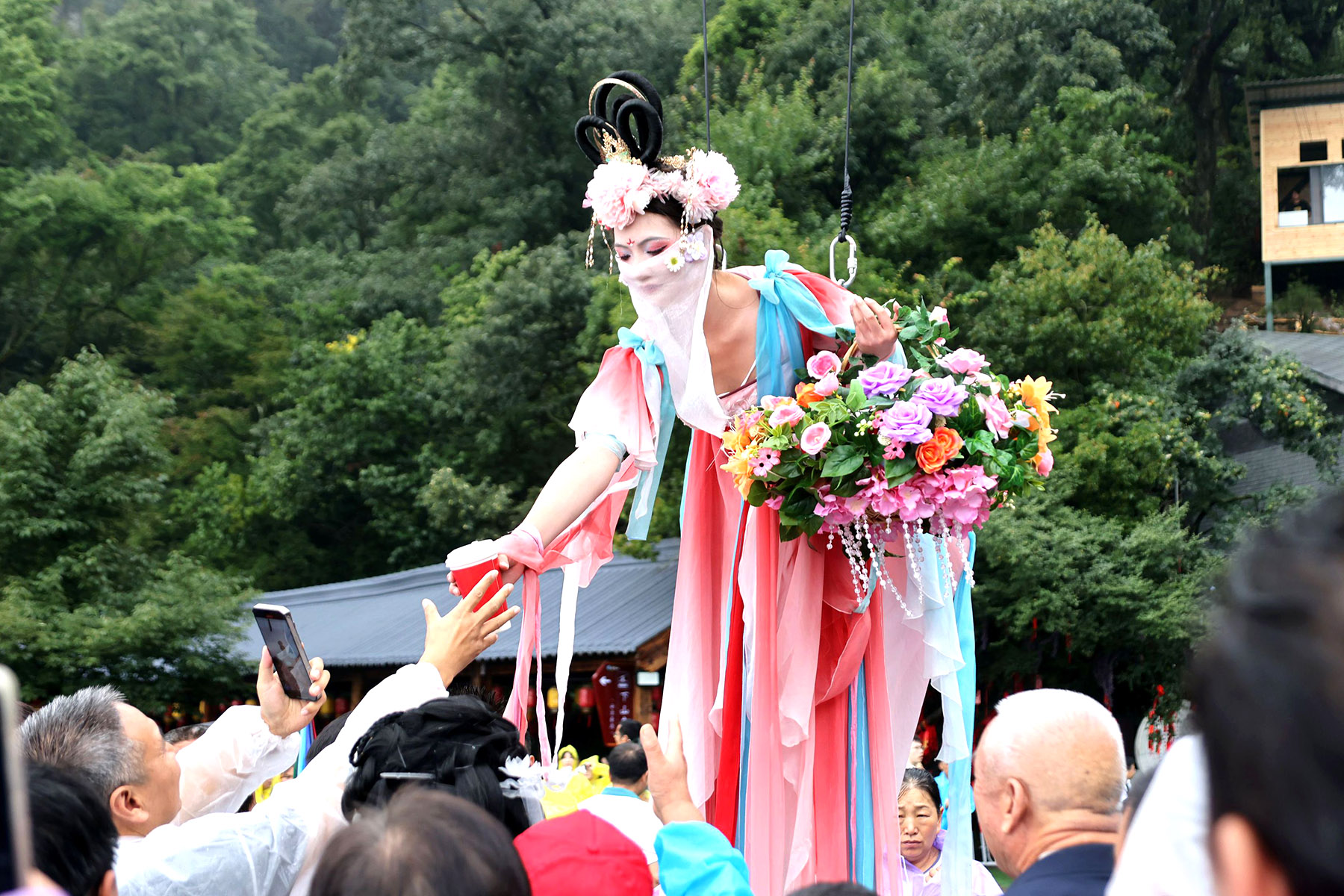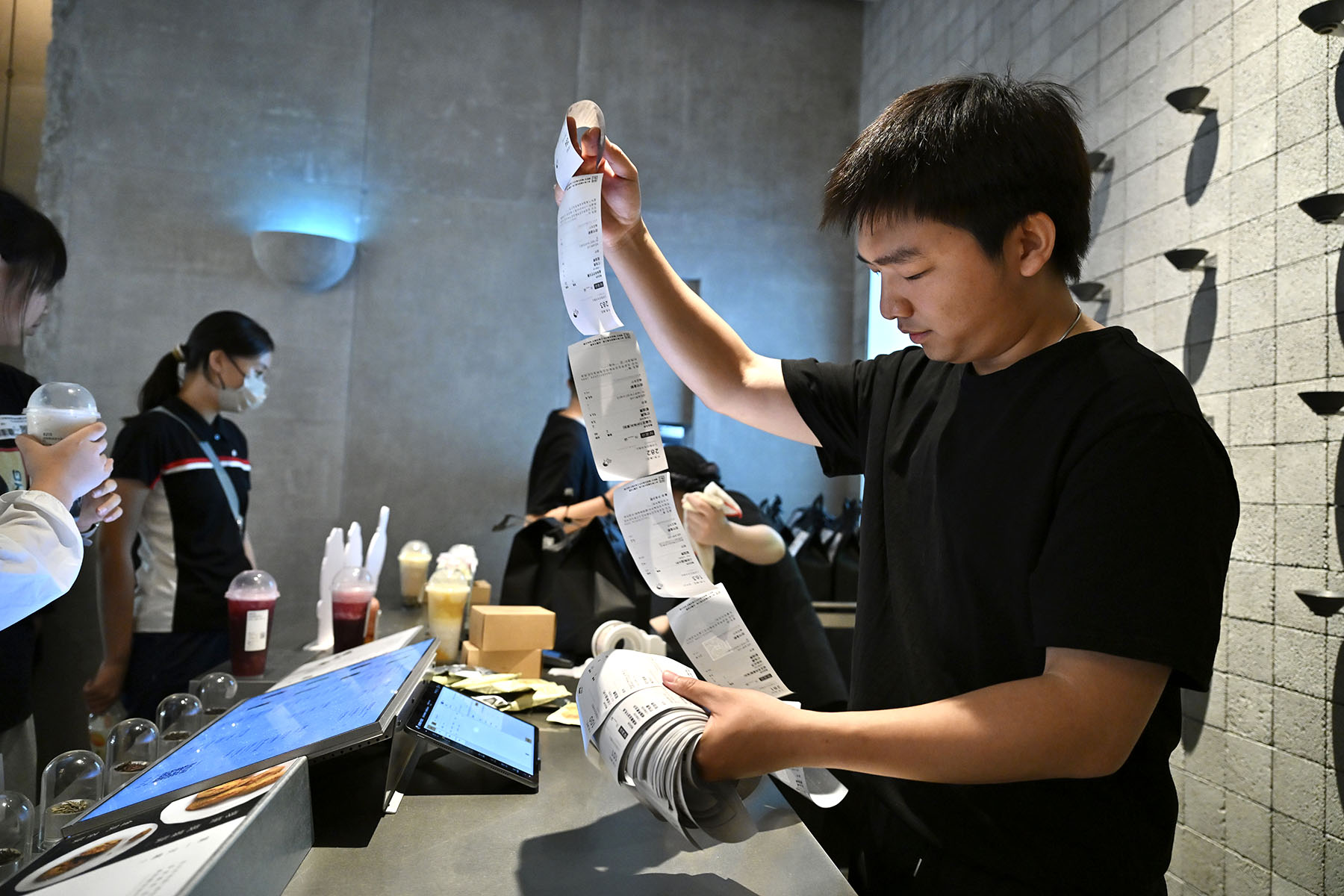As Gen-Z consumers flex their wallets, market for goods that deliver emotional value set to expand rapidly

Fall's onset has sparked an online hashtag — "the first cup of milk tea in autumn" — across the country, turning a seasonal drink into a national ritual.
Every year, at the Chinese solar term Start of Autumn, millions of consumers log on, or line up, for a plastic cup of comfort. This hashtag is once again flooding trend lists: social feeds have overflowed with milk-tea selfies, delivery counters are backed up, and some outlets have logged order backlogs of more than 1,000 cups.
Delivery platforms have become the main battleground.
Meituan said more than 100 tea brands including Mixue, YH Tang and coffee brands including Starbucks and Luckin Coffee, rolled out exclusive products on its platform on this year's Start of Autumn day, which fell on Aug 7, while at least 250,000 beverage outlets joined in the promotions.
READ MORE: Evolving trends of nation's Gen Z shoppers
For Generation Z consumers, the ritual has become less about tea and more about emotion. Ordering a cup is a form of social currency, a way to show affection or simply indulge in an instant, low-cost reward.
"China's new-style milk tea is entering a highlight moment," said Zhu Danpeng, an independent food-and-beverage analyst. Zhu compared the drink to a psychological nudge: a symbol of harvest and abundance that delivers "mood value" alongside caffeine and sugar.
The generational divide is stark.
Post-1990s consumers often buy to "please themselves", while older cohorts lean toward gifts that "please others". As Gen-Z edges into the mainstream, self-reward is becoming not only acceptable, but also visible — documented on feeds and shared in groups.
The appetite for emotionally charged purchases is spreading beyond tea and coffee beverages. From hanfu (traditional Chinese dress) to national-chic apparel, cultural creative goods and IP crossovers, "emotion-plus" is reshaping consumption patterns.
On Dewu App, a trading platform popular with Gen-Z, two drivers dominate: upgrading for quality and aligning with personal values. Toy sales on Dewu surged 310 percent year-on-year in the first half of 2025; blind-box sales rocketed 1,000 percent; and sales of stress-relief toys rose 900 percent.
Nostalgia products such as Phoenix Bicycle's road bike model, launched exclusively on the platform, sold nine times more year-on-year, with 65 percent of new buyers born after 1995.
Research firm iiMedia expects China's animation derivative products market to hit 652 billion yuan ($91.7 billion) in 2025 and 834 billion yuan by 2029. More than 55,000 companies linked to the "emotion economy" have registered in the past five years, including 7,500 in the first half alone, up 16.6 percent from a year earlier.
E-commerce events reflect the shift.

During Tmall's 2025 "618" shopping festival, 453 brands surpassed 100 million yuan in sales. Toys, pets and outdoor sports were breakout categories: six toy merchants cleared 100 million yuan, nearly 100 topped 10 million yuan, and 2,400 shops tripled their sales compared with the previous year.
Future Marketing projects that China's "emotion-consumption "market will surpass 2 trillion yuan in 2025, compounding at 12 percent annually since 2013.
"When film, animation and tourism link up, their combined pull far exceeds any single sector," said Wei Pengju, dean of the cultural economy research institute at the Central University of Finance and Economics. "Quality IPs can monetize through games, theme parks and apparel modifications, delivering premium returns and fueling content innovation."
For businesses, the challenge is how to keep up. "Firms need to decipher emotional needs, innovate products, build brands and adjust strategies quickly," said Zhu Keli, founding director of the China Institute of New Economy.
The most successful players blend emotional resonance with fast execution.
Card maker Kayou, a pan-entertainment industry player whose best-known products are Ultraman collectibles, was quick to seize on the animated summer blockbuster "Nobody".
Nobody follows four underdog monsters — a pig, toad, weasel and ape — who masquerade as characters from Journey to the West in a quest for immortality before finding themselves protecting villagers from malevolent forces.
Within 53 days of release, the film grossed 1.63 billion yuan at the box office and earned an 8.5 rating on Douban. Based on the plot, Kayou designed plush toys, figures and blind-boxes. The results underscore the power of cross-media IP.
The movie has generated more than 200 categories and 800 stock keeping units; and plush dolls and figures lead sales. Derivative revenue reached 7 million yuan on the opening day, while 3 million yuan blind-boxes sold out almost instantly. By Sept 17, its derivatives products had sold more than 30 million yuan.
ALSO READ: Beverage chains expand overseas footprint
According to Maoyan Research Institute, summer 2025 derivative revenue climbed 120 percent year-on-year, with Nobody accounting for nearly a third. Analysts forecast the IP's full-chain value will be above 1 billion yuan.
Products span the pricing spectrum, from a 569 yuan ape plush to 10-30 yuan trinkets. More than 30 companies — including Luckin Coffee, M&G Stationery and Jetsen films — have joined crossovers covering toys, stationery, games, lifestyle goods, auto accessories, apps and themed exhibitions. Merchandise is distributed across Shanghai Film Group's 50 owned cinemas, 800 United Cinema theaters and multiplex chains.
The emotion economy is also reshaping how companies think about loyalty and growth. Analyst Zhu said the momentum shows no sign of slowing. As younger generations with stronger spending power lean into "self-pleasing" consumption, the market for goods that deliver emotional value — whether tea, toys or themed trinkets — is set to expand rapidly.
"The shift is structural," said Zhu. "Emotion is not just a marketing hook, it is becoming a primary axis of the local consumer economy."
Contact the writer at wangzhuoqiong@chinadaily.com.cn


